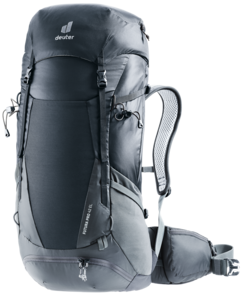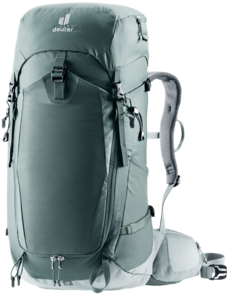Buying a hiking Backpack: athletic, comfortable or ultra-lightweight
Which do you prefer? The thrill of hiking a ridgeline? Or soaking in the views over wide expanses of green pasture? Everyone has their own idea of what happy hiking looks like. So, whether it’s on a day hike or a multi-day walk; for athletic peak baggers or leisurely hikers – your walking backpack needs to fit well with your hiking style, in the same way as your trail buddies who hike with you do. At deuter, we know that ventilation, weight and people’s personal preferences are the most important criteria when choosing a rucksack. And you can choose from four different fits to make sure you end up with the right fit on your body:
- Hiking backpacks in Regular fit for men & anyone with wider shoulders and narrower hips
- Hiking backpacks in SL (Slim Line) fit for women & people with narrower, shorter upper bodies / torsos
- EL (Extra Long) models for people with a longer upper body / back
- Hiking backpacks for kids for budding young hiking fans
Let us help you become ‘hiking happy’ – with a hiking backpack that’s the right fit for you!
More ventilation: Hiking backpacks with maximized comfort
Hiking Packs with the deuter Aircomfort back system for:
- Day-long hikes through easy to moderate terrain
- People who like good airflow across their back when they’re hiking
Good ventilation results in better endurance. When you’re walking for a day or hiking through moderately challenging terrain, the deuter Aircomfort back system will keep your back dry. This well-ventilated carrying system reduces perspiration which helps increase endurance. Its mesh back (used for packs in the Classic series, as well as the Futura and AC Lite hiking backpacks) gives it outstanding carrying comfort. Whether it’s hiking up to the top of Mount Rainier, on a day’s hike in the Grand Canyon, or on a walking holiday in the rolling hills of Napa Valley.
Our top tip: If you’re after good ventilation but also need a more spacious pack, then the Futura hiking backpacks come in 30-liter, 34-liter or even 42-liter models with a spacious main compartment, lid compartment and bottom compartment. If you’re looking for a lightweight hiking backpack with back ventilation, the AC Lite is the one: the smallest model weighs just 810 grams (1.79 lbs).
Our hiking backpacks for those who prioritize ventilation:

BODY-HUGGING FOR A SECRURE FIT: HIKING BACKPACKS FOR VIA FERRATAS AND MOUNTAIN SCRAMBLES / HIKES
Minimal weight: Lightweight backpacks for freedom of movement when hiking
Tips on correct backpack care: If you want your new hiking backpack to last a long time, then caring for it is key. In other words: only wash it when absolutely necessary and do this carefully. Do not use a washing machine. Always allow your backpack to dry fully, and never store it in a damp condition. We recommend using a rain cover in bad weather conditions.
Buying a hiking backpack, how to pack it right, and getting out there
Packing lists for day hikes, backpacking, and ski touring
Let’s go hiking! You’ve finally found the perfect hiking backpack and you’re busy making plans. When you’re hiking in the mountains, keeping down the weight you carry and packing well is important. Our packing list for one-day hikes can help you prepare. Our packing list for multi-day hiking tours can help you make sure you haven’t forgotten anything, and yet still aren’t hauling excess weight with you.
Tips on how to pack and adjust your hiking backpack:
Despite the excellent design of deuter backpacks, with good packing you can improve the weight distribution even more: Heavier items, for instance, should be packed around the same level as your lower back. And check out our tips for adjusting your backpack correctly – it will help ensure you get a pack with the right back length, and that the shoulder straps, hip fins and stabilizer straps all create the perfect fit on your body.
Hiking backpacks, just like hikers, come in all shapes and sizes. The first thing to consider when buying a hiking backpack, is what you plan to do with it. If you want to go on climbing trips over several days through challenging terrain in the high mountains, then you might want to look at a backpack that’s tough and has plenty of space. But if you are going on a hiking holiday in the lower mountain ranges or foothills of the Alps, where the climate is gentler and you plan to return to the same accommodation every night, then you’re best off with a with lower capacity hiking backpack that’s well fitting and made from sturdy materials for your daily carry. The right hiking backpack is about choosing one that suits your needs. Why not reach out to the deuter customer service team for some advice?
When buying a hiking backpack, you should always check the quality. Especially the workmanship, seams and zippers. And check that the straps and buckles are made of hard-wearing materials. Ideally, a hiking backpack should come with a waist belt that will help distribute the weight of the load onto your hips. But make sure that it does not restrict your walking movement or feel uncomfortable. The pack should also create a snug fit against your body.
deuter’s backpacks for hiking range from $65 to $220. A less expensive backpack at the lower end of the price range could be just right for what you need it for. The price will be determined by how lightweight you want it to be, what kind of materials you want, and how much space you need. The higher your requirements, the higher the price tends to be of a hiking backpack. With our deuter hiking backpacks, you can rely on durability and robust materials that are up to the rigors of both hiking and transit — after all, airports and bus stations are not renowned for their careful baggage handling. But should something break on your backpack, you can always make use of our lifelong repair service.
Most hiking packs come in volumes between 40 and 70 liters. You could use these figures as a guideline. The right size for your hiking backpack will depend on how much you need to take with you – after all, an alpine traverse will require different packing to a day’s hiking at low altitude. Added to that, the more space you have, the more you tend to pack… even if it’s not stuff that’s absolutely necessary. So, try to assess your requirements carefully, to avoid carrying excess weight.
Why choose a deuter hiking backpack?
Experience, innovation and passion all contribute to the success of deuter’s backpacks. Founded over 100 years ago, the company designs highly functional hiking backpacks in collaboration with mountain athletes and mountain guides. The outcome is trailblazing features and designs. The following are characteristics and traits that hiking, climbing and backpacking enthusiasts appreciate about deuter hiking backpacks:
- Sturdy & top quality: Robust, durable materials make deuter hiking backpacks hard-wearing hiking companions that last for many years.
- Lifelong repair service: No matter how old, we’ll always try to fix your favorite backpack. You can find out about our repair service here.
- Lightweight: Many of our newer models benefit from reduced and optimized materials combined with streamlined patterning that saves overall weight.
- Comfortable and easy on the back: Three-dimensional ergonomically shaped hip padding wraps around the pelvic bones, which results in a more comfortable carry for hours on end. S-shaped shoulder straps with soft edging reduces strain on the neck and shoulders and enhances range of movement.
- The right fit for all body shapes: The larger the capacity, the more important it is to have a back system that fits. Which is why deuter has developed two special categories: SL (Slim Line) for women and EL (Extra Long) for people with longer backs.
- Sustainable: We inspect and ensure that environmental standards are met throughout the deuter supply chain and that we use more sustainable materials with more sustainable processes. Fair trade and fair working conditions are also important to us. And so, at deuter, we work with numerous initiatives and organizations to meet our responsibilities. We are members of the Fair Wear Foundation and the Partnership for Sustainable Textiles; we use bluesign® certified materials for some of our backpacks and have several entire products that are bluesign® accredited, and we never use any PFC or PFAS in our waterproofing finishes. You can find out more about deuter’s Responsibility Policy here.





















































































































